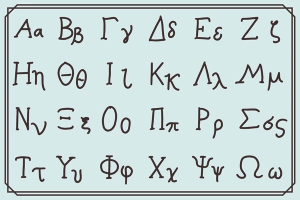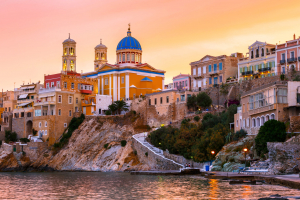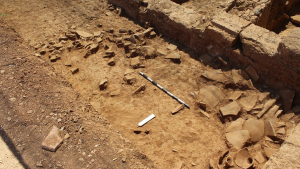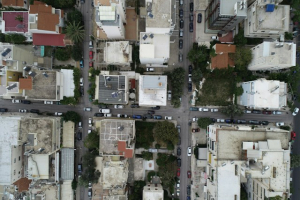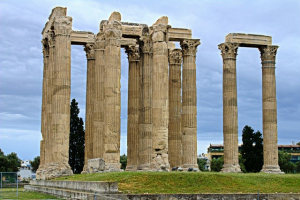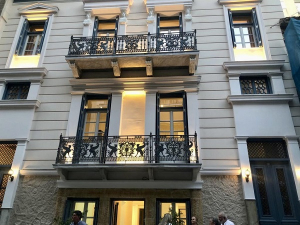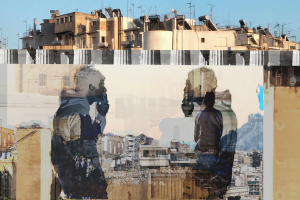LIFE & CULTURE
XpatAthens
Tuesday, 30 January 2024 14:33
10 English Words You Didn't Know Had Greek Origins
Language is an ever-evolving entity, perpetually shaped by diverse influences and borrowing from the rich tapestry of human history. English, as a melting pot of linguistic influences, serves as a vibrant testament to this dynamic process. Among the numerous languages contributing to its lexicon, Greek stands out as a venerable source, its roots extending deep into the corridors of antiquity.
The Greek language stands as one of the oldest and most influential linguistic sources in history. Its enduring legacy has not only shaped the cultural and philosophical landscape but has also gifted the world with a myriad of words. From everyday vocabulary to scientific terminology, the Greek language has left an indelible mark on the way we communicate.
Let's take a look at 10 common English words you may not know are of Greek origin!
Museum: The word "museum" comes from the Greek "Mouseion," which referred to a temple or a place dedicated to the Muses, the goddesses of the arts and sciences in Greek mythology. Museums, as we know them today, are institutions that house and display artistic, historical, and scientific artifacts.
Cynic: When you describe someone as cynical, you're tapping into the Greek philosophy of the Cynics. "Kynikos" in Greek means "dog-like," and the Cynics were followers of an ancient philosophical school that believed in living a simple, virtuous life in accordance with nature.
Panic: The term "panic" has its origins in Greek mythology. Pan, the Greek god of the wild, was believed to instill sudden fear in travelers in isolated areas. The intense, sudden fear associated with Pan's presence gave rise to the word "panic" in English.
Chaos: In Greek mythology, Chaos refers to the formless, shapeless void that existed before the creation of the universe. The English word "chaos" adopted this concept to describe a state of utter confusion or disorder.
Aesthetic: When we talk about aesthetic appreciation, we are drawing on the Greek word "aisthesis," which means "perception" or "sensation." Aesthetics involves the study of beauty and artistic principles.
Therapy: Derived from the Greek word "therapeia," meaning healing or medical treatment, "therapy" in English refers to the treatment of a physical or mental ailment through various methods, emphasizing the healing aspect.
Elixir: From the Greek word "xērion," meaning powder for drying wounds, "elixir" in English refers to a magical or medicinal potion believed to have the power to prolong life.
Problem: The word "problem" comes from the Greek word "problema," which means a task, a question, or a puzzle. In ancient Greece, a problem was a mathematical proposition for consideration.
Tomb: The English word "tomb" has its roots in the Greek word "tymbos" and the Latin word "tumulus," both referring to a burial mound or a grave. Over time, the term evolved into its current usage to describe a place for the dead, often marked by a monument or structure.
Priest: The term "priest" comes from the Old English word "preost," which is ultimately derived from the Latin "presbyter" and the Greek "presbyteros." In the Christian context, it refers to an elder or a minister of a Christian church.
Published in
Greek Language & Culture
Tagged under
Monday, 29 January 2024 07:00
Ermoupolis Is The Second Most Welcoming City In The World According To Booking.com
Booking.com, a renowned global booking platform, has recently unveiled its esteemed Traveler Review Awards 2024, showcasing the world's most welcoming destinations. From charming coastal retreats to serene mountain havens, these places have earned their spots through a remarkable display of hospitality, as evidenced by a staggering 309 million valid reviews from Booking.com travelers.
In a testament to its exceptional hospitality, Ermoupolis of Syros has secured the second position in this year's list of the world's 10 most hospitable cities. This capital city is a masterpiece in itself, adorned with beautiful neoclassical structures, the grand City Hall in Miaouli Square designed by Ernesto Ziller, and the historic Municipal Theater of Apollo, crafted in 1864 by the skilled hands of Italian architect Pietro Sambo. The cityscape is akin to an open-air museum, featuring mansions along the waves in the aristocratic Vaporia district, the iconic church of Agios Nikolaos with its characteristic blue dome, and other splendid Orthodox and Catholic churches.
Awards Criteria
It's essential to note that destinations are ranked based on the total number of Traveler Review Award 2024 recipients. These prestigious awards are derived from an extensive pool of over 309 million verified reviews, recognizing businesses that consistently deliver excellent service and unwavering hospitality.
Continued Excellence: Italy Dominates
For the seventh consecutive year, Italy stands out with the highest number of awardees, boasting an impressive total of 181,012 awards. Following closely are Spain (125,611), France (124,361), Germany (86,910), and the United Kingdom (74,754), showcasing the unwavering commitment to exceptional service across these European nations.
The World's Most Welcoming Destinations
Now, let's dive into the lists of the most welcoming destinations around the globe, according to this year's prestigious Booking.com awards:
The 10 Most Welcoming Cities:
- Arraial d'Ajuda, Brazil
- Ermoupolis, Greece
- Viana do Castelo, Portugal
- Daylesford, Australia
- Grindelwald, Switzerland
- Moab, United States
- Uzes, France
- Mazatlan, Mexico
- Jaisalmer, India
- Fujikawaguchiko, Japan
The 10 Most Welcoming Regions:
-
Perthshire, United Kingdom
-
Penghu, Taiwan
-
Boyaca, Colombia
-
Trentino-Alto Adige, Italy
-
Los Lagos, Chile
-
Erongo, Namibia
-
Otago, New Zealand
-
Lapland, Finland
-
Asturias, Spain
-
Friesland, Netherlands
Originally published in Greek on: syrostoday.gr
Translated by: Codico Lab
Published in
Greece In The News
Tagged under
Friday, 26 January 2024 09:07
How To Become A Successful Digital Nomad In Greece
Greece, with its rich history, stunning landscapes, and warm Mediterranean climate, has become an increasingly popular destination for digital nomads seeking a blend of work and adventure. However, before embarking on your journey to this captivating country, it's crucial to take several factors into account.
Here's what to consider when contemplating Greece as your next digital nomad and remote working destination:
Here's what to consider when contemplating Greece as your next digital nomad and remote working destination:
1. Choose The Right Location
Greece offers a diverse range of locations for digital nomads. Consider popular destinations like Athens, Thessaloniki, or big islands such as Crete, Santorini, or Corfu. Each place has its own unique charm, cultural experiences, and connectivity options. Assess your preferences and needs to find the perfect spot that aligns with your work and lifestyle.
2. Secure A Reliable Internet Connection
As a digital nomad, a stable internet connection is paramount. Ensure your chosen accommodation provides high-speed and reliable Wi-Fi. Consider having a backup option, like a local SIM card with a data plan, in case of any disruptions.
As a digital nomad, a stable internet connection is paramount. Ensure your chosen accommodation provides high-speed and reliable Wi-Fi. Consider having a backup option, like a local SIM card with a data plan, in case of any disruptions.
3. Explore Co-Working Spaces
Greece has seen a rise in co-working spaces catering to the growing number of digital nomads. These spaces offer a professional work environment, networking opportunities, and essential amenities. Popular co-working hubs include The Cube Athens and Stone Soup in Athens, providing a vibrant community for remote workers.
Greece has seen a rise in co-working spaces catering to the growing number of digital nomads. These spaces offer a professional work environment, networking opportunities, and essential amenities. Popular co-working hubs include The Cube Athens and Stone Soup in Athens, providing a vibrant community for remote workers.
4. Understand The Visa Regulations
Before embarking on your digital nomad journey to Greece, familiarize yourself with the visa regulations. Introduced in 2021, the Digital Nomad Visa for Greece allows people who are not citizens of the European Union or European Economic Area and who work remotely to legally live and work in Greece for up to one year. It also allows you to bring your immediate family members with you, as long as you meet all the requirements.
5. Embrace the Greek Lifestyle
One of the joys of being a digital nomad in Greece is familiarising yourself with the local culture. Enjoy the delectable Mediterranean cuisine, explore ancient ruins, and participate in traditional festivals. Balancing work with leisure will enrich your experience and contribute to your overall well-being.
6. Network Locally
Build connections with fellow digital nomads and locals alike. Attend meetups, networking events, or join online communities to exchange insights and tips and perhaps collaborate on projects. Building a supportive network can enhance your professional and personal life while living in Greece.
7. Manage Time Zones Effectively
Working as a digital nomad often involves dealing with clients or teams in different time zones. Plan your work schedule to accommodate any time differences, and communicate transparently with your clients or colleagues to manage expectations.
8. Stay Active and Healthy
The Greek outdoors offer ample opportunities for physical activities. Balance your sedentary work hours with exploration and exercise. Hike the mountains, swim in the crystal-clear waters, or practice yoga on the beach—maintaining a healthy lifestyle is key to a successful and fulfilling digital nomad experience.
Becoming a successful digital nomad in Greece involves a thoughtful blend of work, exploration, and cultural immersion. With reliable internet, a welcoming community, and the beauty of the Greek landscape, your journey can be both professionally rewarding and personally enriching. So, pack your bags, set up your remote office, and let Greece be the backdrop to your digital nomad adventure!
Published in
Tips & Advice
Tagged under
Thursday, 25 January 2024 07:00
Roman-Era Wine Shop Discovered In Greece
Archaeologists in Greece discovered a 1,600-year-old Roman-era wine shop that met its end due to a sudden event, possibly an earthquake or building collapse. The findings include broken vessels and sixty scattered coins, offering a glimpse into the past.
This ancient shop was active during the time when the Roman Empire had control over the region. The site of this discovery is the ancient city of Sikyon (Sicyon), situated on the northern coast of the Peloponnese in southern Greece.
As experts explored the wine shop, they unearthed not just coins but also bits of marble tabletops and various vessels crafted from bronze, glass, and ceramic, reported Live Science.
Unclear about types of wine
In a recent presentation at the annual meeting of the Archaeological Institute of America in Chicago, archaeologists revealed that the wine shop was situated on the northern part of a larger complex.
This complex housed several workshops equipped with kilns and installations specifically designed for pressing grapes or olives.
Scott Gallimore, an associate professor of archaeology at Wilfrid Laurier University in Canada, and Martin Wells, an associate professor of classics at Austin College, explained via email that there is no direct evidence about the specific types of wine sold at the shop.
Although they found grape pips (Vitis vinifera), the researchers are unable to provide more detailed information at this time.
Apart from wine, the shop might have also traded in other goods, such as olive oil. Scott Gallimore said the majority of the coins discovered belong to the era of Constantius II, spanning from 337 to 361. The most recent coin in the collection was minted sometime between 355 and 361, as revealed in a Live Science email.
Destruction as a result of an earthquake or roof collapse
The wine shop, according to Scott Gallimore, seems to have experienced a “sudden event” leading to its destruction and abandonment. The sixty bronze coins discovered on the floor date back to the final moments of the shop.
The coins were all scattered about on the floor of the shop. This suggests they were kept together, possibly in a ceramic container or some sort of bag. When the shop was destroyed, it seems the container fell to the floor, as did the coins, Gallimore explained.
There is currently uncertainty about the nature of the event. The destruction could have been caused by an earthquake or a possible roof collapse caused by environmental factors, such as excessive rainfall, said Gallimore. Following the destruction, there was debris and sediment all over the place, but no attempt was made to retrieve anything from it.
The larger complex, including the shop, seems to have been deserted in the early fifth century, potentially around the time of the destructive event.
Originally published on: greekreporter.com
Originally published on: greekreporter.com
Photo Credit: Scott Gallimore
Published in
Local News
Tagged under
Tuesday, 23 January 2024 11:55
How 7 Athens Neighborhoods Got Their Names
As we stroll through the streets of Athens, a city steeped in history and culture, we encounter distinctive neighborhoods, each with its own captivating story. From the coastal charm of Glyfada to the historic Anafiotika, these districts hold tales that reflect the essence of Athens. Join us as we uncover the simple yet fascinating origins behind the names and histories of these neighborhoods, providing a glimpse into the city's vibrant past and the threads that weave its diverse urban fabric.
Glyfada
Glyfada, a picturesque suburb in the south of Athens, has stood as a model spa town since the early 20th century. The beaches, now a hub of recreational activity, underwent a transformation from their earlier association with the invigorating mountain air. The name "Glyfada" is attributed to the discovery of "glyfo nero" (brackish water) during a well-drilling endeavor in 1920.
Psychiko
Legend intertwines with benevolent acts in the naming of Psychiko. According to one account, the area earned its name when the marathoner Pheidippides, after announcing the victory of the Athenians over the Persians in the Battle of Marathon, drew his last breath there. "Psyche," meaning soul in Greek, reflects Pheidippides breathing his soul away. Alternatively, the name is associated with Osia Filothei, who, out of goodwill, opened a well to quench the thirst of passersby and farmers—an act termed "psychiko" in Greek, earning her the honor of having the area named after her.
Legend intertwines with benevolent acts in the naming of Psychiko. According to one account, the area earned its name when the marathoner Pheidippides, after announcing the victory of the Athenians over the Persians in the Battle of Marathon, drew his last breath there. "Psyche," meaning soul in Greek, reflects Pheidippides breathing his soul away. Alternatively, the name is associated with Osia Filothei, who, out of goodwill, opened a well to quench the thirst of passersby and farmers—an act termed "psychiko" in Greek, earning her the honor of having the area named after her.
Patisia
Patisia's nomenclature traces back to a peculiar origin. The name is derived from the phrase "papa pata isia," roughly translating to "walk straight" in English. Local children coined this term to tease a perpetually intoxicated Turkish Aga who stumbled in the area. The children, witnessing his unsteady steps, would playfully shout "papa pata isia," leading to the christening of the region as Patisia.
Ekali
Ekali draws its name from the ancient Attic municipality of Ekali of the Leontidos tribe. Numerous historical accounts place it along the Athens-Marathona axis, with ties to the myth of Theseus and the Bull of Marathon. The ancient municipality derived its name from Ekali, the host of Theseus during his quest, who beseeched Zeus for victory. Theseus, in her honor, established the Ekalisia festival.
Metaxourgeio
The name Metaxourgeio, translating to "silk factory" in Greek, finds its roots in a silk fabric manufacturing facility established in 1835. Housed within the incomplete residence of Prince Katakouzinos, a structure preserved to this day on Megalo Alexandrou, Millerou, and Yatrakou streets, the silk factory left an indelible mark on the area's identity.
Anafiotika
Transporting visitors to the idyllic carefreeness of a Cycladic island, Anafiotika in Plaka is a charming enclave. Crafted in the mid-19th century by skilled artisans from Anafi and other Aegean regions, the houses boast Cycladic architecture. Cobblestone streets and climbing plants contribute to the island ambiance, providing Athens with a touch of Aegean allure.
Chalandri
Chalandri, once a region abundant with arable lands, was originally known as the "Flyas Municipality" due to its thriving agricultural activity. During the Turkish occupation, the majority of these lands fell under the possession of the Chalas manor, leading to the eventual naming of the area as Chalandri.
Published in
City Discovery
Tagged under
Tuesday, 23 January 2024 11:27
5 Reasons To Explore Greek History
Greek history is a captivating journey through the annals of time, offering profound insights into the foundations of Western civilization. From the legendary tales of gods and heroes to the philosophical musings of brilliant minds, Greek history is a rich tapestry that continues to shape our understanding of the world. In this article, we'll delve into the top five reasons why exploring Greek history is not only an intellectual adventure but also a key to unlocking the mysteries of our present.
1. Foundations of Democracy
One of the most enduring legacies of ancient Greece is the concept of democracy. The city-state of Athens, in particular, laid the groundwork for a political system where citizens had a say in decision-making. Understanding the origins of democracy in ancient Greece provides us with valuable insights into the evolution of governance, helping us appreciate the complexities and strengths of modern democratic societies.
One of the most enduring legacies of ancient Greece is the concept of democracy. The city-state of Athens, in particular, laid the groundwork for a political system where citizens had a say in decision-making. Understanding the origins of democracy in ancient Greece provides us with valuable insights into the evolution of governance, helping us appreciate the complexities and strengths of modern democratic societies.
2. Epic Myths and Legends
The tales of Greek mythology are woven into the fabric of Western literature and culture. From the heroic exploits of Achilles in the Trojan War to the cunning adventures of Odysseus, these myths offer timeless lessons about the human condition. Exploring Greek mythology allows us to connect with universal themes of love, betrayal, and the pursuit of greatness, resonating across generations and enriching our understanding of storytelling.
3. Philosophical Pioneers
Ancient Greek philosophers, including Socrates, Plato, and Aristotle, are intellectual giants whose ideas continue to influence philosophy, science, and ethics. By examining their profound insights into the nature of existence, morality, and the pursuit of knowledge, we gain a deeper appreciation for the roots of Western thought. These philosophical foundations remain relevant, inspiring ongoing discussions about the meaning of life and the nature of truth.
4. Architectural Marvels
The Greeks were master architects, creating enduring structures that showcased their ingenuity and aesthetic sensibilities. The Parthenon in Athens, for example, stands as a testament to classical Greek architecture. Studying these ancient structures not only provides a glimpse into the technological prowess of the time but also offers a lens through which we can appreciate the impact of design and aesthetics on our built environment today.
5. Cultural and Artistic Influence
Greek art, drama, and literature have left an indelible mark on the cultural landscape. From the tragedies of Aeschylus and Sophocles to the timeless sculptures depicting idealized human forms, Greek artistic achievements remain influential. Exploring these cultural treasures enhances our understanding of artistic expression, beauty, and the human experience, fostering a connection between the past and present.
Greek history serves as a treasure trove of knowledge, offering a profound understanding of the roots of Western civilization. From the birth of democracy to the philosophical musings of brilliant minds, the impact of Greek history on our world today is immeasurable. By exploring the timeless tales, wisdom, and achievements of ancient Greece, we embark on a journey that enriches our perspectives, connecting us with the enduring legacy of this remarkable civilization.
The tales of Greek mythology are woven into the fabric of Western literature and culture. From the heroic exploits of Achilles in the Trojan War to the cunning adventures of Odysseus, these myths offer timeless lessons about the human condition. Exploring Greek mythology allows us to connect with universal themes of love, betrayal, and the pursuit of greatness, resonating across generations and enriching our understanding of storytelling.
3. Philosophical Pioneers
Ancient Greek philosophers, including Socrates, Plato, and Aristotle, are intellectual giants whose ideas continue to influence philosophy, science, and ethics. By examining their profound insights into the nature of existence, morality, and the pursuit of knowledge, we gain a deeper appreciation for the roots of Western thought. These philosophical foundations remain relevant, inspiring ongoing discussions about the meaning of life and the nature of truth.
4. Architectural Marvels
The Greeks were master architects, creating enduring structures that showcased their ingenuity and aesthetic sensibilities. The Parthenon in Athens, for example, stands as a testament to classical Greek architecture. Studying these ancient structures not only provides a glimpse into the technological prowess of the time but also offers a lens through which we can appreciate the impact of design and aesthetics on our built environment today.
5. Cultural and Artistic Influence
Greek art, drama, and literature have left an indelible mark on the cultural landscape. From the tragedies of Aeschylus and Sophocles to the timeless sculptures depicting idealized human forms, Greek artistic achievements remain influential. Exploring these cultural treasures enhances our understanding of artistic expression, beauty, and the human experience, fostering a connection between the past and present.
Greek history serves as a treasure trove of knowledge, offering a profound understanding of the roots of Western civilization. From the birth of democracy to the philosophical musings of brilliant minds, the impact of Greek history on our world today is immeasurable. By exploring the timeless tales, wisdom, and achievements of ancient Greece, we embark on a journey that enriches our perspectives, connecting us with the enduring legacy of this remarkable civilization.
Published in
Greek Philosophy & History
Tagged under
Monday, 22 January 2024 13:15
Ziller Mansion Transforms Into Cultural Hub, Welcoming All
Prepare to be captivated by the splendidly renovated neoclassical gem at 24 Perikleous Street, situated in the enchanting Terpsithea neighborhood of Piraeus. Unveiling a fusion of history and modernity, this architectural masterpiece is not just a mansion; it's a vibrant hub buzzing with educational, recreational, and cultural activities, inviting both public and private institutions, as well as individuals, to partake in its allure.
In the heart of Piraeus's historical center, a mere stone's throw from the Archaeological Museum, stands the Ziller mansion—an elegant residence erected in 1899 by the renowned architect Ernst Ziller. This distinguished architect, celebrated for crafting a series of neoclassical marvels in Piraeus, once counted King George I and Queen Olga among the illustrious guests in one of his creations. Notably, Ziller himself resided in this very neighborhood.
In its heyday, the district served as the bustling port of Piraeus, earning the moniker "neighborhood of the captains" due to its proximity to the sea. Now, this meticulously renovated neoclassical house, spanning an impressive 605.89 sq. m., stands as a living testament to its historic legacy.
The grandeur of this architectural wonder, adorned with breathtaking ceiling decorations, classical elements, and an undeniable stately charm, is truly impressive. Spread across three floors, with the ground floor encompassing 150.30 sq.m., the first and second floors totaling 157.17 sq.m., and the third floor, with an additional outdoor area, measuring 133.22 sq.m.
Inquiries are welcomed through phone calls at 2104513086 or 6947612210 and via email at 24perikleous@gmail.com. Convenient parking is available in close proximity at Skuze 26, making your visit to this historical treasure effortlessly accessible.
Originally published in Greek on: iefimerida.gr
Originally published in Greek on: iefimerida.gr
Translated by: Codico Lab
Published in
Local News
Tagged under
Thursday, 18 January 2024 08:50
George Seferis: Sixty Years Since The Nobel Prize
On October 24, 1963, the Swedish Academy announced Giorgos Seferis as its laureate for the Nobel Prize. Sixty years after that historic occasion, the Benaki Museum holds the opening of the exhibition entitled “George Seferis: sixty years later," dedicated to the historic anniversary of the announcement itself and the award ceremony that followed it, on December 10, 1963.
Built around Seferis’ Nobel Prize, which belongs in the permanent collection of the Ghika Gallery, the exhibition presents a range of artefacts and photographic documents. It comprises three units: The first pertains to the day of the announcement, the second centres on the evening of the award ceremony, and the last is dedicated to its aftermath and features relevant press articles, letters, and telegrams of congratulations. Posters, newspapers of the day, and visual and audio documents displayed alongside personal objects of the poet’s create an environment that evokes the magnitude of the event and showcases his personality.
The material making up the exhibition derives from Seferis’ archive, which is held at the Gennadius Library, the collections of the Benaki Museum, and private collections.
IN COLLABORATION WITH the Swedish Embassy in Athens
Opening Hours: Wednesday, Thursday, Friday, and Saturday, 10:00 - 18:00
Opening Hours: Wednesday, Thursday, Friday, and Saturday, 10:00 - 18:00
Published in
Art
Tagged under
Thursday, 18 January 2024 08:30
Goodnight, I love you: Maria Callas Centenary
The exhibition entitled “Good night, I love you” tries to highlight the personality of the great diva both on and off the stage. It is based on personal memorabilia and dresses of Maria Callas from the collection of Nikos Charalampopoulos. It is complemented by a sample costume made by Yannis Tsarouchis for the performance of the opera Medea at Epidaurus, by four models of Lila de Nobili’s costumes from the performance of La Traviata at La Scala in Milan, a model of Piero Toschi’s costume for Pasolini’s Medea and by models of costumes made by Yannis Tsarouchis, loans from foundations and private individuals.
Opening Hours: Monday – Sunday / 10:00 – 18:00
Guided Tour: Open Sundays at 16:00 (with queueing system)
Published in
Art
Tagged under
Thursday, 18 January 2024 08:23
FokiaNou Art Space: Destination Athens, Group Exhibition
Since ancient times, Athens has attracted people to visit, live, or study. From the early post-war years, Athens became a tourist destination, with iconic buildings such as the Hilton symbolizing this effort, even if it usually functioned as just a stopover before the islands. But in recent years, the city has experienced an unprecedented tourist boom. For some foreigners, the city has become a place of residence, from digital nomads to artists and curators. The city is changing at a rapid pace; empty buildings have taken on new life and form; businesses are opening; forgotten neighborhoods are popping up; and new jobs are being created. At the same time, however, rents are rising to high and unsustainable levels, as is the overall cost of living for permanent residents, while Athens' infrastructure remains incomplete even in the most basic areas, such as pavements, with the otherwise problematic public space of the city being given over to all kinds of private, commercial use.
But what is the reality of Athens today, behind the windows of hotels and cafes, beyond the foreign publications that present it as the ideal combination of chaos and history, beach and art? Athens is constantly changing and receiving people and their worlds, shaping and being shaped by them. Athens is travel and escape, experiences and emotions, smells and tastes, photo clicks and Instagram poses; it is beauty and ugliness together, happy moments and misery.
Fourteen artists present their response to this question in various media, answering an open call put out by FokiaNou Art Space. Participants: Neva Bergemann, Sofia Charoni, Mary Cox, Panagiotis Ferentinos, Sidan Ghazi, Constantina Halkias, Maria Karassavidou, Panos Liapis, Christos Movidis, Despoina Pantazi, Geeta Roopnarine, Stephanie Sampson, Stella Sevastopoulos, and Kiveli Zachariou.
Opening days and hours: Thursday to Saturday, 17.00–20.00
Curated by Mary Cox and Panagiotis Voulgaris
FokiaNou Art Space is an artist-run project space in the intimacy of a small apartment in an old building in the center of Athens. The space encourages collaborative creative efforts between Greek and foreign artists, thereby promoting and supporting the local art community. The space hosts exhibitions, workshops and projects under the direction of two artists, Mary Cox and Panagiotis Voulgaris.
FokiaNou Art Space is an artist-run project space in the intimacy of a small apartment in an old building in the center of Athens. The space encourages collaborative creative efforts between Greek and foreign artists, thereby promoting and supporting the local art community. The space hosts exhibitions, workshops and projects under the direction of two artists, Mary Cox and Panagiotis Voulgaris.
Published in
Art
Tagged under

